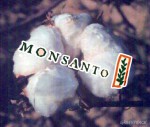News
2014-11-24 | permalink
Rising suicide rate for Indian farmers blamed on GMO seeds
 Corporate cotton
Corporate cotton
Monsanto, which has just paid out $2.4 million to US farmers, settling one of many lawsuits it’s been involved in worldwide, is also facing accusations that its seeds are to blame for a spike in suicides by India farmers.
The accusations have not transformed into legal action so far, but criticism of Monsanto has been mounting, blaming the giant company for contributing to over 290,000 suicides by Indian farmers over the last 20 years.
The author of a documentary on Indian farmers’ suicides, Alakananda Nag, who has interviewed dozens of the relatives of those who have taken their lives, links the rise in the suicide rate to the use of GMO seeds. She believes small farms are particularly vulnerable.
“The large farms certainly have the funds to support themselves and get on, but the smaller ones are really ones that suffer the most,” Nag told RT. “Monsanto definitely has a very big hand to play. A few years ago it was illegal to grow GMO crops in India. It’s not like the suicide did not exist back then. It did, but I think there was definitely a sharp rise in the [suicide] numbers once [GMOs] were allowed.”
The Center for Human Rights and Global Justice has estimated that in 2009 alone 17,638 Indian farmers committed suicide, or one suicide every 30 minutes.
Farmers’ widows, such as Savithri Devi from India’s southern state of Telangana, explain just how tough things can get for those trying to grow enough crops to earn a living.
“[My husband] initially put a bore well, then started cultivation, but we didn’t get enough water from the bore well and there were no rains, too,” Devi told RT. “So he again tried to deepen the bore well, but it didn’t work. So he borrowed money. His depression eventually led him to committing suicide. He drank pesticide and died.”
The legalization of GMO in 2002 has only added to the stress experienced by Indian farmers, according to the head of the Council for Responsible Genetics, Sheldon Krimsky.
 Rising suicide rate for Indian farmers blamed on GMO seeds
Rising suicide rate for Indian farmers blamed on GMO seeds Farmer Suicides in India | CHRGJ
Farmer Suicides in India | CHRGJ Monsanto BT Cotton and Indian Farmers - Vandana Shiva - How Monsanto Destroys Farming - YouTube
Monsanto BT Cotton and Indian Farmers - Vandana Shiva - How Monsanto Destroys Farming - YouTube From Seeds of Suicide to Seeds of Hope: Why Are Indian Farmers Committing Suicide and How Can We Stop This Tragedy? | Vandana Shiva
From Seeds of Suicide to Seeds of Hope: Why Are Indian Farmers Committing Suicide and How Can We Stop This Tragedy? | Vandana Shiva Council for Responsible Genetics: GeneWatchVolume 26 Issue 1 Genetics in Agriculture
Council for Responsible Genetics: GeneWatchVolume 26 Issue 1 Genetics in Agriculture Picking Cotton: The choice between organic and genetically-engineered cotton for farmers in South India | Greenpeace India
Picking Cotton: The choice between organic and genetically-engineered cotton for farmers in South India | Greenpeace India
